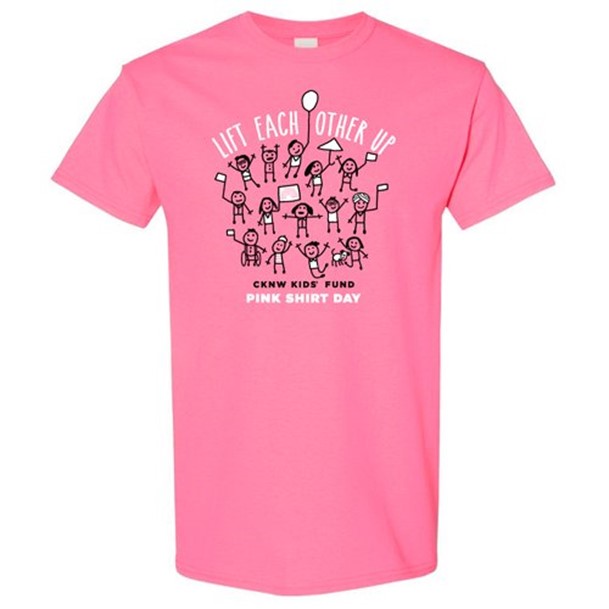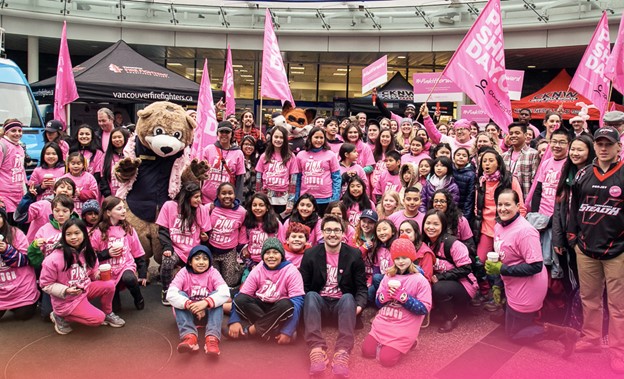Pink Shirt Day / Anti-bullying Day

Now a movement celebrated across the globe, Pink Shirt Day has humble beginnings. Here is a snippet of an article from the Globe & Mail detailing the original incident:
“David Shepherd, Travis Price and their teenage friends organized a high-school protest to wear pink in sympathy with a Grade 9 boy who was being bullied [for wearing a pink shirt]. [They] took a stand against bullying when they protested against the harassment of a new Grade 9 student by distributing pink T-shirts to all the boys in their school. ‘I learned that two people can come up with an idea, run with it, and it can do wonders,’ says Mr. Price, 17, who organized the pink protest. ‘Finally, someone stood up for a weaker kid.’ So Mr. Shepherd and some others headed off to a discount store and bought 50 pink tank tops. They sent out messages to schoolmates that night, and the next morning they hauled the shirts to school in a plastic bag. As they stood in the foyer handing out the shirts, the bullied boy walked in. His face spoke volumes. ‘It looked like a huge weight was lifted off his shoulders,’ Mr. Price recalled. The bullies were never heard from again.”
After David and Travis’ act of kindness in 2007, others were inspired to help other youth affected by bullying, with many staff members wearing pink shirts and collecting funds to support Boys and Girls Clubs. Since then, the idea has only grown each year, with worldwide support and participation. Countries across the globe are now organizing anti-bullying fundraisers of their own, including Japan, New Zealand, China, Panama, and numerous others. In fact, last year alone, people in almost 180 countries shared their support of Pink Shirt Day through social media posts and donations.
Pink Shirt Day falls on the last Wednesday of February every year; the next next Pink Shirt Day is on February 23rd, 2022.

Here is a story from one of the program beneficiaries, Greater Vancouver YMCA:
“Serious bullying can happen when groups of friends get together and target a specific person. In fact “mobbing,” as it is often called, can have very serious effects on the victims—from social isolation to depression, and in some extreme cases, even suicide. In October, three grade 9 students were referred to the YMCA Alternative Suspension Program for cyberbullying. The program takes in students who have been suspended from school and works with them to get the tools they need to succeed in school. Many have been victims of bullying or have been bullies themselves.
In this case the young men were perpetrators – they had made up inappropriate stories about another boy who went to their school and shared them online in a chat room that was frequented by many other students from the same school. This was a first time offense for all three of them, but due to its seriousness and the fact that the school has a zero tolerance policy on bullying, they were suspended.
When the three students first arrived at the YMCA Alternative Suspension Program, they didn’t seem to understand why they were suspended. They minimized their behaviour, and said they thought it was just funny and cool, especially when more and more students started joining in and talking about it.
YMCA staff members started working with them right away so they could gain a better understanding of the consequences of their actions. Through examples and role playing they learned about empathy. They had time to reflect on how they would feel if someone — or a group of their high school peers — made up stories about them.
During their time in the program the students participated in a number of sessions covering other topics such as healthy social media habits, peer pressure, and taking responsibility for your own actions. They had the chance to spend valuable time one on one with the staff in order to explore their behaviours more deeply. All the while they were in the program they were required to keep up to date on their school work.
By the end of the program all three of the students came to the realization that the bullying behaviour they had engaged in “for fun” was actually very serious. They understood that the effects of bullying are devastating, took responsibility for their actions and felt very remorseful.
As a part of the program they are encouraged to apologize to the person they had bullied. They not only apologized to their classmate and promised never to bully him again, they went one step further and vowed to do what they could to prevent this from happening to other students at their school.
In a follow up meeting with the students, YMCA staff were very pleased to learn that one of the perpetrators had become friends with the classmate he had previously bullied. “I learned that they started spending time together after the program, which was pretty amazing to see,” said a YMCA Youth Worker. “After learning this I realized how far the students had come.”

https://www.pinkshirtday.ca/about